仁爱英语九年级unit5topic3练习题及答案解析
- 格式:docx
- 大小:46.13 KB
- 文档页数:8
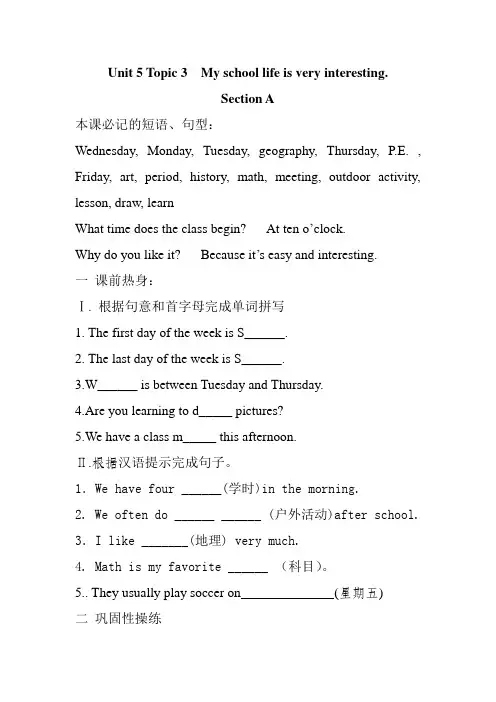
Unit 5 Topic 3 My school life is very interesting.Section A本课必记的短语、句型:Wednesday, Monday, Tuesday, geography, Thursday, P.E. , Friday, art, period, history, math, meeting, outdoor activity, lesson, draw, learnWhat time does the class begin? At ten o’clock.Why do you like it? Because it’s easy and interesting.一课前热身:Ⅰ. 根据句意和首字母完成单词拼写1. The first day of the week is S______.2. The last day of the week is S______.3.W______ is between Tuesday and Thursday.4.Are you learning to d_____ pictures?5.We have a class m_____ this afternoon.Ⅱ.根据汉语提示完成句子。
1.We have four ______(学时)in the morning.2. We often do ______ ______ (户外活动)after school. 3.I like _______(地理) very much.4. Math is my favorite ______ (科目)。
5.. They usually play soccer on (星期五)二巩固性操练Ⅰ.选择最佳答案。
( )1. --_____ is it today?--It's Friday.A. WhatB. What dayC. What dateD. When( )2.--What class are they having?--They are having a ____ class.A. EnglishB. JapanC. ChineseD. China( )3.--How often do you do outdoor activities?--_____.A. Every dayB. EverydayC. Three dayD. Once( )4.--____ music lessons do you have every week?--Two.A. How muchB. HowC. How manyD. How often( )5. ___________ pictures do you have?A. How manyB. How muchC. How oldD. How long( )6 Look! He ________ Chinese problems.A. is working onB. is workingC. works onD. work on( )7 We learn history. We ________ the past.A. learn aboutB. learnC. learn toD. study( )8 They are having an art class. They __________.A. are drawing picturesB. are singing and dancingC. are speaking EnglishD. are working on math problems( )9. ---_____ are they having?---They are having a music class.A. WhatB. What classC. What timeD. What day( )10. It’s 12 o’clock.. The last class is ___.A. beginB. beginsC. overD. finishⅡ.补全对话。
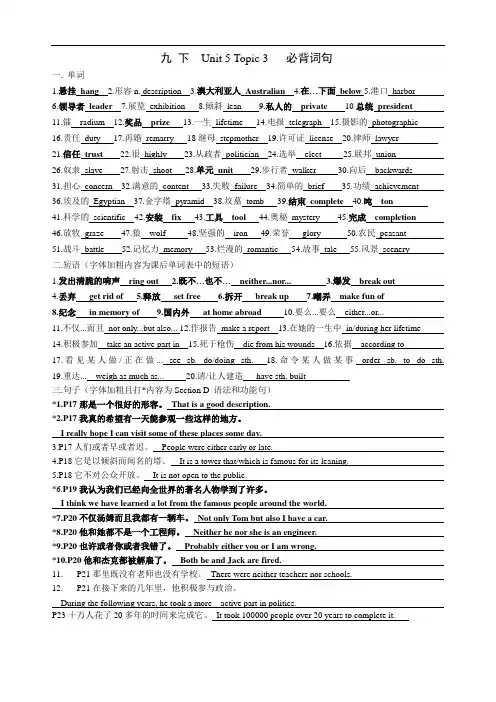
九下Unit 5 Topic 3 必背词句一. 单词1.悬挂hang2.形容n. description3.澳大利亚人Australian4.在…下面below5.港口harbor6.领导者leader7.展览exhibition8.倾斜lean9.私人的private10总统president11.镭radium 12.奖品prize13.一生lifetime 14.电报telegraph 15.摄影的photographic16.责任duty 17.再婚remarry 18继母stepmother 19.许可证license 20.律师lawyer21.信任trust22.很highly 23.从政者politician 24.选举elect 25.联邦union26.奴隶slave 27.射击shoot 28.单元unit 29.步行者walker 30.向后backwards31.担心concern 32.满意的content 33.失败failure 34.简单的brief 35.功绩achievement36.埃及的Egyptian 37.金字塔pyramid 38.坟墓tomb 39.结束complete40.吨ton41.科学的scientific 42.安装fix43.工具tool44.奥秘mystery 45.完成completion46.放牧graze 47.狼wolf 48.坚强的iron 49.荣誉glory 50.农民peasant51.战斗battle 52.记忆力memory 53.烂漫的romantic 54.故事tale 55.风景scenery二.短语(字体加粗内容为课后单词表中的短语)1.发出清脆的响声ring out2.既不…也不…neither...nor...3.爆发break out4.丢弃get rid of5.释放set free6.拆开break up7.嘲弄make fun of8.纪念in memory of 9.国内外at home abroad 10.要么...要么either...or...11.不仅...而且not only...but also... 12.作报告make a report 13.在她的一生中in/during her lifetime14.积极参加take an active part in 15.死于枪伤die from his wounds 16.依据according to17.看见某人做/正在做... see sb. do/doing sth. 18.命令某人做某事order sb. to do sth.19.重达... weigh as much as... 20.请/让人建造have sth. built三.句子(字体加粗且打*内容为Section D 语法和功能句)*1.P17那是一个很好的形容。
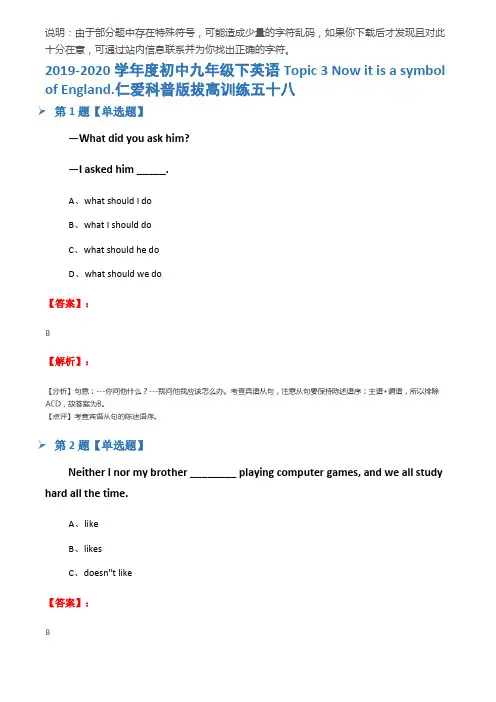
2019-2020学年度初中九年级下英语Topic 3 Now it is a symbol of England.仁爱科普版拔高训练五十八➢第1题【单选题】—What did you ask him?—I asked him _____.A、what should I doB、what I should doC、what should he doD、what should we do【答案】:【解析】:➢第2题【单选题】Neither I nor my brother ________ playing computer games, and we all study hard all the time.A、likeB、likesC、doesn"t like【答案】:【解析】:➢第3题【单选题】If he keeps on working so hard, he"ll under the pressure of work.A、break downB、break awayC、break outD、break into【答案】:【解析】:➢第4题【单选题】— How can I move the stone? It weighs as _______ as 2 tons.— Don"t worry. We"ll help you.A、muchB、manyC、more【答案】:【解析】:➢第5题【单选题】It ______ me three months ______ the work.A、took; to finishB、spent; finishingC、paid; forD、took; finish【答案】:【解析】:➢第6题【单选题】—Which do you prefer, soda or coffee?—I like ______ of them. Tea is my favorite.A、bothB、eitherC、neither【答案】:【解析】:➢第7题【单选题】— Do you know the Statue of Liberty in the USA?— Yes. It________ New York Harbor.A、stands inB、stands forC、stands up【答案】:【解析】:➢第8题【单选题】I don"t ______ his words, because he isn"t worth _____.A、trust; trusting inB、trust in; trustingC、trust; trustingD、trust in; trusting in【解析】:➢第9题【单选题】Barack Obama ________ the 44^th President of the United States.A、electB、was electedC、is electedD、elects【答案】:【解析】:➢第10题【单选题】I earned the Nobel for literature.A、ProudB、PrideC、PrizeD、Price【解析】:➢第11题【单选题】— How do you like the sound of my old watch?— That"s great! It can still ________.A、ring upB、ring outC、ring backD、ring off【答案】:【解析】:➢第12题【阅读理解】阅读理解(A)Americans will long remember President Abraham Lincoln, the 16th President of the United States.At the age of 19, Abraham Lincoln took a boat down the Ohio River to New Orleans. There Lincoln saw for the first time slaves being sold in the marketplace. At that time, Lincoln made up his mind to work to end slavery for the rest of his life.In 1836, Lincoln became a lawyer and was famous for being hard-working and honest. He believed that the US stood for freedom for all. He wanted to become a senator (参议员). In 1858, Lincoln debated(争论) against Stephen Douglas who was also a candidate for the Senate from Illinois.Because of the Lincoln-Douglas debates, Lincoln became known across the country. Then he decided to run for the presidency in 1860. At last he ran against Stephen Douglas and two other candidates.Lincoln took the oath (誓言) of office to become president of the United States on March 4, 1861. It was a difficult time to be president. Many southern states did not agree with Lincoln about canceling slavery, and declared(宣布) that they were no longer part of the US. The famous Civil War began in April, 1861.Lincoln"s Union Army fought the Southern Confederate Armies. Many soldiers were killed in the battles. One of the battles took place in Gettysburg, Pennsylvania. In 1863, a ceremony was held to memorize the dead on the Gettysburg battlefield. Lincoln made a famous speech known as the Gettysburg Address.Unfortunately, Lincoln was shot while watching a play at Ford"s Theatre and passed away on the morning of April 15, 1865.根据短文内容,选择正确答案。
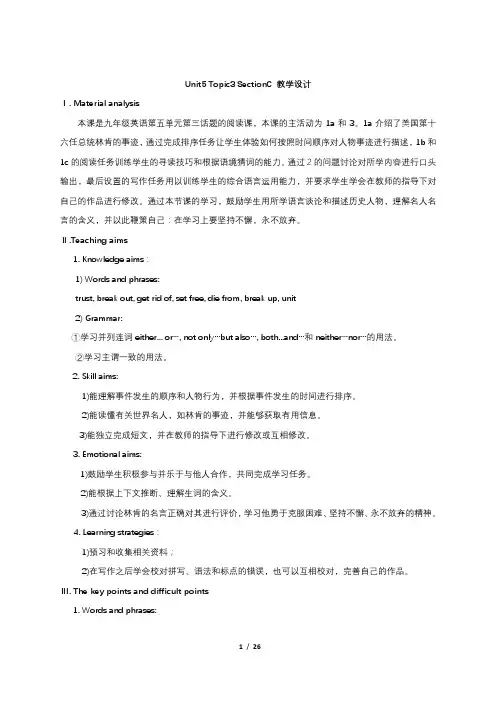
Unit5 Topic3 SectionC 教学设计Ⅰ. Material analysis本课是九年级英语第五单元第三话题的阅读课,本课的主活动为1a和3。
1a介绍了美国第十六任总统林肯的事迹,通过完成排序任务让学生体验如何按照时间顺序对人物事迹进行描述,1b和1c的阅读任务训练学生的寻读技巧和根据语境猜词的能力。
通过2的问题讨论对所学内容进行口头输出,最后设置的写作任务用以训练学生的综合语言运用能力,并要求学生学会在教师的指导下对自己的作品进行修改。
通过本节课的学习,鼓励学生用所学语言谈论和描述历史人物,理解名人名言的含义,并以此鞭策自己:在学习上要坚持不懈,永不放弃。
Ⅱ.Teaching aims1. Knowledge aims:1) Words and phrases:trust, break out, get rid of, set free, die from, break up, unit2) Grammar:①学习并列连词either... or…, not only…but also…, both...and…和neither…nor…的用法。
②学习主谓一致的用法。
2. Skill aims:1)能理解事件发生的顺序和人物行为,并根据事件发生的时间进行排序。
2)能读懂有关世界名人,如林肯的事迹,并能够获取有用信息。
3)能独立完成短文,并在教师的指导下进行修改或互相修改。
3. Emotional aims:1)鼓励学生积极参与并乐于与他人合作,共同完成学习任务。
2)能根据上下文推断、理解生词的含义。
3)通过讨论林肯的名言正确对其进行评价,学习他勇于克服困难、坚持不懈、永不放弃的精神。
4. Learning strategies:1)预习和收集相关资料;2)在写作之后学会校对拼写、语法和标点的错误,也可以互相校对,完善自己的作品。
Ⅲ. The key points and difficult points1. Words and phrases:trust, break out, get rid of, set free, die from, break up, unit2. Sentences:1) In Illinois, there were neither teachers nor schools, but Lincoln’s stepmother encouraged him to study.2) He learned to read and write while working on the farm.3) People trusted him and began to call him “Honest Abe”.4) The southern states wanted to keep the laws that allowed them to own slaves.3. Grammar:1) Conjunctions;2) Agreement of subject and predicate.Ⅳ. Teaching aids多媒体课件,教学机。
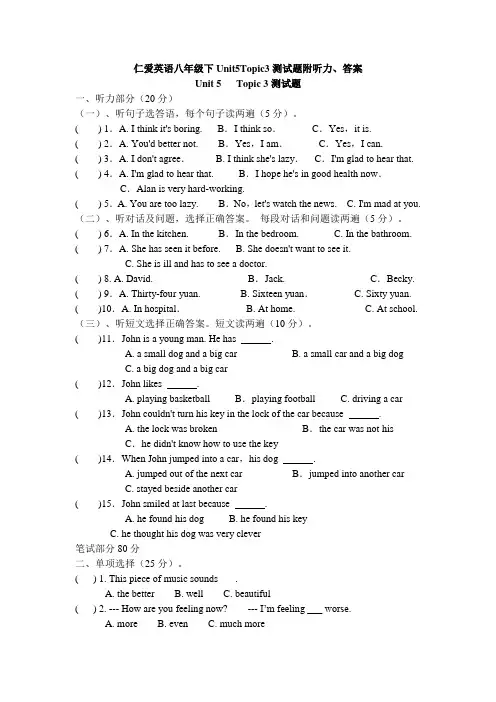
仁爱英语八年级下Unit5Topic3测试题附听力、答案Unit 5 Topic 3测试题一、听力部分(20分)(一)、听句子选答语,每个句子读两遍(5分)。
( ) 1.A. I think it's boring. B.I think so.C.Yes,it is.( ) 2.A. You'd better not. B.Yes,I am.C.Yes,I can.( ) 3.A. I don't agree. B. I think she's lazy.C.I'm glad to hear that. ( ) 4.A. I'm glad to hear that. B.I hope he's in good health now.C.Alan is very hard-working.( ) 5.A. You are too lazy. B.No,let's watch the news. C. I'm mad at you. (二)、听对话及问题,选择正确答案。
每段对话和问题读两遍(5分)。
( ) 6.A. In the kitchen. B.In the bedroom. C. In the bathroom. ( ) 7.A. She has seen it before. B. She doesn't want to see it.C. She is ill and has to see a doctor.( ) 8. A. David. B.Jack. C.Becky. ( ) 9.A. Thirty-four yuan. B. Sixteen yuan. C. Sixty yuan. ( )10.A. In hospital. B. At home. C. At school. (三)、听短文选择正确答案。
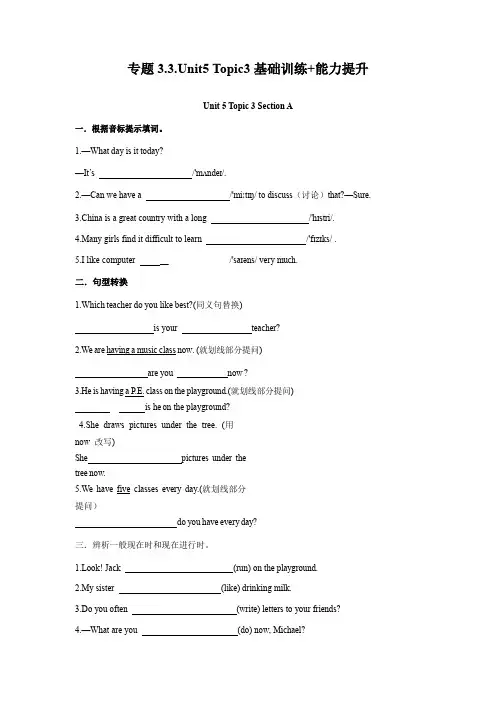
专题3.3.Unit5 Topic3基础训练+能力提升Unit 5 Topic 3 Section A一.根据音标提示填词。
1.—What day is it today?—It’s /'mʌndeɪ/.2.—Can we have a /'miːtɪŋ/ to discuss(讨论)that?—Sure.3.China is a great country with a long /'hɪstri/.4.Many girls find it difficult to learn /'fɪzɪks/ .5.I like computer __ _____________ /'saɪəns/ very much.二.句型转换1.Which teacher do you like best?(同义句替换)is your teacher?2.We are having a music class now. (就划线部分提问)are you now ?3.He is having a P.E. class on the playground.(就划线部分提问)is he on the playground?4.She draws pictures under the tree. (用now 改写)She pictures under thetree now.5.We have five classes every day.(就划线部分提问)do you have every day?三.辨析一般现在时和现在进行时。
1.Look! Jack (run) on the playground.2.My sister (like) drinking milk.3.Do you often (write) letters to your friends?4.—What are you (do) now, Michael?—I (clean) the room.5.Linda often (have) breakfast at 8:00 in the morning.【答案】一1. Monday;2. meeting; 3. history; 4. physics; 5. science句型转换二1. Who; favorite2.What; doing3.What class; having4. is drawing5.How many classes三1.is running; 2. likes; 3. write; 4.doing; am cleaning 5. hasUnit 5 Topic 3 Section B一.根据音标提示填词1.I think history is very /'ɪntrəstɪŋ/. Many students in my class like it.2.It’s /'i:zi/ to get the virus(病毒)if you don’t wear amask(口罩).3.—Which /'sʌbdʒɪkt/ do you like best?—I like politics best.4./wɪtʃ/ dress do you like better, the blue one or the red one?5. Jimmy has a poor handwriting, so it’s /'dɪfɪkəlt/ to read.二.句型转换根据要求变换句型,每空填一词。
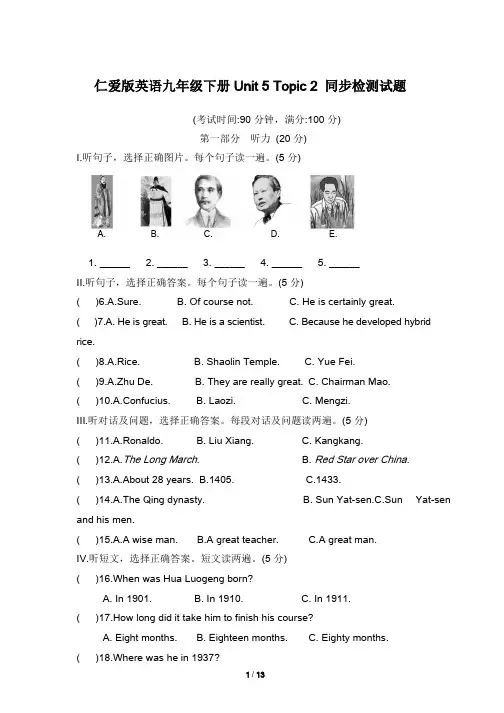
仁爱版英语九年级下册Unit 5 Topic 2 同步检测试题(考试时间:90 分钟,满分:100 分)第一部分听力(20 分)Ⅰ.听句子,选择正确图片。
每个句子读一遍。
(5 分)A. B. C. D. E.1. ______2. ______3. ______4. ______5. ______Ⅱ.听句子,选择正确答案。
每个句子读一遍。
(5 分)( )6.A.Sure. B. Of course not. C. He is certainly great.( )7.A. He is great. B. He is a scientist. C. Because he developed hybrid rice.( )8.A.Rice. B. Shaolin Temple. C. Yue Fei.( )9.A.Zhu De. B. They are really great. C. Chairman Mao.( )10.A.Confucius. B. Laozi. C. Mengzi.Ⅲ.听对话及问题,选择正确答案。
每段对话及问题读两遍。
(5 分)( )11.A.Ronaldo. B. Liu Xiang. C. Kangkang.( )12.A.The Long March. B. Red Star over China.( )13.A.About 28 years. B.1405. C.1433.( )14.A.The Qing dynasty. B. Sun Yat-sen.C.Sun Yat-sen and his men.( )15.A.A wise man. B.A great teacher. C.A great man.Ⅳ.听短文,选择正确答案。
短文读两遍。
(5 分)( )16.When was Hua Luogeng born?A. In 1901.B. In 1910.C. In 1911.( )17.How long did it take him to finish his course?A. Eight months.B. Eighteen months.C. Eighty months.( )18.Where was he in 1937?1/ 13A. In China.B.In the USA.C.In Great Britain.( )19.When did he return to China from the USA?A.In 1936.B.In 1938.C.In 1950.( )20.How long did he live?A.75 years.B.70 years.C.80 years.第二部分基础知识运用(55 分)Ⅰ.单项选择。
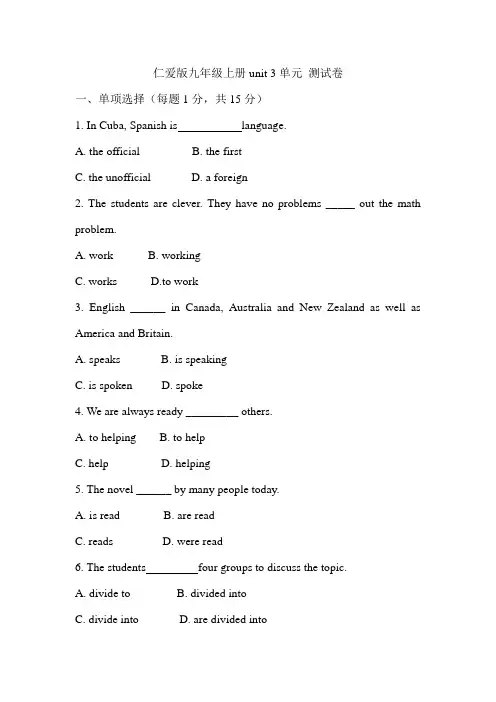
仁爱版九年级上册unit 3单元测试卷一、单项选择(每题1分,共15分)1. In Cuba, Spanish is language.A. the officialB. the firstC. the unofficialD. a foreign2. The students are clever. They have no problems _____ out the math problem.A. workB. workingC. worksD.to work3. English ______ in Canada, Australia and New Zealand as well as America and Britain.A. speaksB. is speakingC. is spokenD. spoke4. We are always ready _________ others.A. to helpingB. to helpC. helpD. helping5. The novel ______ by many people today.A. is readB. are readC. readsD. were read6. The students four groups to discuss the topic.A. divide toB. divided intoC. divide intoD. are divided into7. If you have any difficulty here,you can help.A. ask forB. ask toC. would likeD. want to8. —Are you your birthday party?—Yes. Everything is ready.A. ready toB. ready forC. be ready toD. be ready for9. I’m so lucky because I see more cartoon characters next month.A. is able toB. will be able toC. be able to C. was able to10. Mary _______ the song at a party.A. heard singB. was heard singC. heard to singD. was heard to sing11. Your bike can’t ______ there.A. be putB. is putC. be puttedD. putted12. —Do you know where Tom is?—Yes. He _____ his hometown.A. went toB. goes toC. has gone toD. has been to13. ______ you dive into the water,______ you breathe.A. Deeper,harderB. The deeper,the harderC. The deep,the hardD. Deep,hard14. Look! A big modern building _________ in our city.A. is builtB. is being builtC. has been builtD. is building15. Some eggs and a glass of milk ____ the Frenchman.A. have been brought toB. has been brought toC. have been broughtD. has been brought二、完形填空(每空1分,共10分)When learning new vocabulary, don’t just memorize a list of words.1 , try to make five sentences using each new word. Then use the new word as often as you can the first day you learn it. This way you will remember new words2 longer.Practising sounds, you know, is difficult-the “th” sound for example. Choose words that 3 “th” and repeat t hem over and over until you are comfortable with them. Let's try! This, that, those, them, think, thought, through, thin….Read, read, read-in English, of course! Reading is one of 4 ways to increase your vocabulary and 5 your grammar in a natural and fun way. Be sure to choose topics or books you are interested in.When someone 6 in English, listen to the main point. If you 7 a word you don’t understand, ignore8 and go on listening. If you stop and think about the word, you will miss 9 the person is saying.Always remember-practice 10 perfect.1. A. Instead of B. Instead C. Rather than D. and2. A. much B. many C. more D. most3. A. end up with B. begin C. begin with D. end up4. A. best B. the best C. better D. good5. A. encourage B. change C. improveD. turn6. A. is talking B. talk C. are talking D. talked7. A. listen B. hear C. listen to D. will hear8. A. one B. them C. it D. they9. A. nothing else B. everything elseC. everything otherD. else everything10. A. makes B. making C. make D. is making三、阅读理解(每题2分,共20分)AMy Plan for Learning EnglishMany students and teachers always ask this question “What’s the best way to learn English well?” Different people have different answers.Here is my plan for learning English.It is based on(根据) my own experience in learning languages.It helped me when I learned English.I hope that it can help you,too.·Speak to Americans as much as possible.·Write,write,write—letters,emails,notes,etc.·Make phone calls to practise your English.·Watch TV and movies.·Listen to the radio.·Read as much as possible.It is important to believe that you will improve your English.Sometimes when you make plans,they seem very difficult.Progress comes little by little.Think about where you are today,and where you were last week or last month.Maybe it doesn’t seem you have come very far.But if you stop and think about where you were six months ago,or even a year ago,then you will see your progress.That progress gives you hope.Keep on studying,and you will reach your goal sooner or later!1.What do students and teachers often ask?A.How to speak English well.B.How to write English well.C.How to read English well.D.How to learn English well.2.The plan for learning English is based on ______.A.a student’s teaching storyB.a student’s learning storyC.an English teacher’s experienceD.the writer’s experience3.Which of the following is NOT true about the writer?A.He reads aloud in the morning.B.He watches English movies.C.He often writes English notes.D.He sometimes speaks English with friends on the phone.4.What is important for an English learner?A.To study English every day.B.To speak with Americans.C.To listen to the radio.D.To believe that he will improve his English.5.The underlined word“progress” probably means “______” in Chinese.A.经历B.错误C.进步D.失败BDo you remember the first word that you spoke? If you can, you are unusual. Suppose what your life was like during the first few months. I’m sure that it took your most time to eat,sleep and cry. As you grew older you slept less. Your parents would spend more time playing with you and talking to you. You watched and listened. You got to know that people make some sounds to go with some things.Then you began to cry and to make sounds you heard. And little by little you could make right sound for one thing.Then you got to understand the secret of the language. It is that a certain sound means a certain thing. One sound could be as good as another. But it is not so good as a word if everybody doesn’t agree o n its meaning. Only when a group of people make and use the same set of sounds of things they can understand each other. Their own language comes into being.After you knew the “secret” you learned words. Some of the words meant things such as cars, books, birds and stores. Some of the words meant movements such as come, fly and swim. And other words express things such as “I would like to make friends with you.” This is language that people can communicate by the way of language. That is to say, languages mean communication.6. can remember the day when we spoke out first word.A. Few of usB. Many peopleC. Most peopleD. Someone7. When you were a little baby you .A. made sound to let people know that you want to eatB. spent most of your time eating, crying and sleepingC. could not hear any sound around youD. spent most of your time playing with your parents8. The secret of language is that .A. one sound might be as good as anotherB. a certain sound is for a certain thingC. people can understand each otherD. there is a special sound for each other9. The phrase “make sounds” mean.A.制造声音B.发音C.哭闹D.表达10. The best title of this passage is .A. The LanguageB. Learn LanguageC. Make SoundsD. The Secret of Language四、词汇运用(每空1分,共10分)1. Can you t________ this Chinese sentence into English?2. It is important for you to buy a g_________ book when you learn a foreign language.3. Tom is an English boy, he comes from B_________.4. —We know several m_________ of English learning from this passage.—Remember to choose one that fits you best.5. The English l__________ is becoming more and more important.6. There are ________ (difference) between British English and Australian English.7. If you want to make yourself ________(understand), you should speakclearly and slowly.8. Speech is the fastest method of _________ (communicate) between people.9. The place of interest is visited by millions of ________(tourist).10. With ________(who) do you often practice your English?五、按要求完成句子(每题2分,共20分)1.我们不把英语当作第一语言使用。
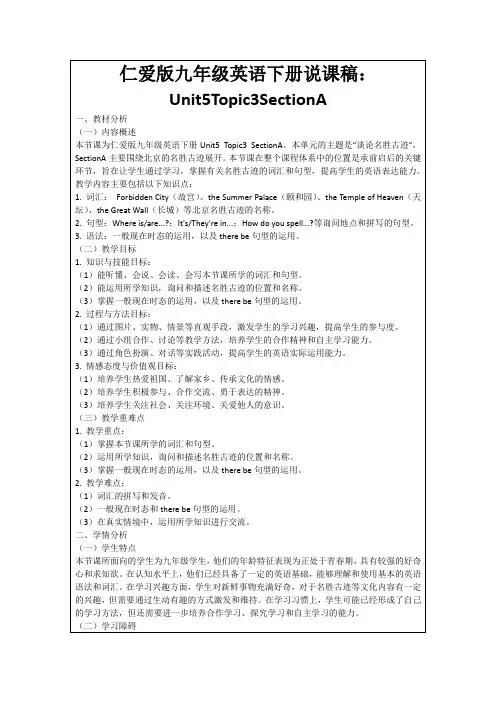
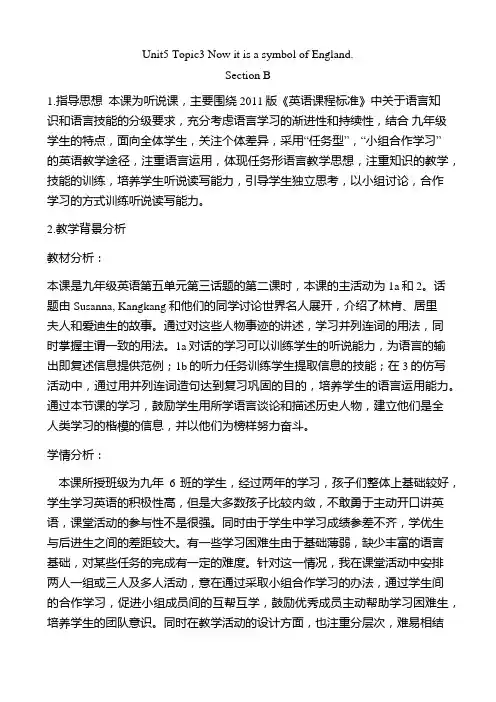
Unit5 Topic3 Now it is a symbol of England.Section B1.指导思想本课为听说课,主要围绕2011版《英语课程标准》中关于语言知识和语言技能的分级要求,充分考虑语言学习的渐进性和持续性,结合九年级学生的特点,面向全体学生,关注个体差异,采用“任务型”,“小组合作学习”的英语教学途径,注重语言运用,体现任务形语言教学思想,注重知识的教学,技能的训练,培养学生听说读写能力,引导学生独立思考,以小组讨论,合作学习的方式训练听说读写能力。
2.教学背景分析教材分析:本课是九年级英语第五单元第三话题的第二课时,本课的主活动为1a和2。
话题由Susanna, Kangkang 和他们的同学讨论世界名人展开,介绍了林肯、居里夫人和爱迪生的故事。
通过对这些人物事迹的讲述,学习并列连词的用法,同时掌握主谓一致的用法。
1a对话的学习可以训练学生的听说能力,为语言的输出即复述信息提供范例;1b的听力任务训练学生提取信息的技能;在3的仿写活动中,通过用并列连词造句达到复习巩固的目的,培养学生的语言运用能力。
通过本节课的学习,鼓励学生用所学语言谈论和描述历史人物,建立他们是全人类学习的楷模的信息,并以他们为榜样努力奋斗。
学情分析:本课所授班级为九年6班的学生,经过两年的学习,孩子们整体上基础较好,学生学习英语的积极性高,但是大多数孩子比较内敛,不敢勇于主动开口讲英语,课堂活动的参与性不是很强。
同时由于学生中学习成绩参差不齐,学优生与后进生之间的差距较大。
有一些学习困难生由于基础薄弱,缺少丰富的语言基础,对某些任务的完成有一定的难度。
针对这一情况,我在课堂活动中安排两人一组或三人及多人活动,意在通过采取小组合作学习的办法,通过学生间的合作学习,促进小组成员间的互帮互学,鼓励优秀成员主动帮助学习困难生,培养学生的团队意识。
同时在教学活动的设计方面,也注重分层次,难易相结合,让各个层面的学生都参与进来,提高他们综合运用语言的能力,让他们都能体验到成功的喜悦,使各层次的学生都有所收获。
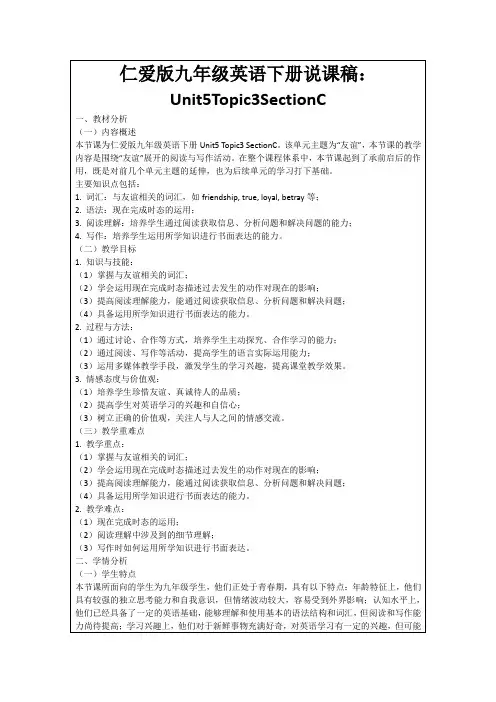
Unit5 Topic3第二部分英语知识运用(55分)Ⅰ. 单项选择。
(10分)1. —Colors can affect our feelings and moods.—____A. You must be joking.B. Good idea.C. I agree with you.D. I’m glad to hear that.【解析】C 情景交际,考查如何赞同别人的看法。
I agree with you.我赞同你的看法。
故选C。
2. He always gets ____ when giving a speech.A. nervousB. nervouslyC. relaxedD. relaxing【解析】A C、D不符合语境,get为连系动词,应加形容词作表语。
故选A。
3. Practice ____ the piano, and you will play it well.A. to playB. playC. playingD. played【解析】C practice doing sth.练习做某事。
4. Helen and Bob are working hard these days because they will put ____ a short play in theschool Talent(才艺) show.A. overB. awayC. offD. on【解析】D put on“上演,放映,这里意为演一部短剧。
”故选B。
5. His words made me ____.A. angryB. angrilyC. to be angryD. being angry【解析】A考查make后加复合宾语结构。
make sb. angry使某人生气,angry为形容词作宾语补足语。
6. This is Tom’s book. Please give ____.A. him itB. it himC. him to itD. it to him【解析】D当give的直接宾语为代词时,尤其是两个宾语都是代词时,常用“give+直接宾语+to+间接宾语”结构。
0 仁爱版英语九年级下册 校本作业
◆ 目录
Unit 5 China and the World Topic 1 .........................................................1 Topic 2.........................................................11 Topic 3.........................................................22 Unit5 检测卷................................................... 33
Unit 6 China and the World Topic 1.........................................................38 Topic 2.........................................................48 Topic 3.........................................................60 Unit6 检测卷................................................... 71
参考答案...................................................... .77 1
Unit5 Topic1 China attracts millions of tourists from all over the world
Section A 学校 班级 学生 完成时间:(30分钟以内)(编者:郭丽青)
一.基础训练: Ⅰ.根据句意及首字母提示完成句子。 1. The teacher let us i ourselves to others when we met the first time. 2. —Do you know the h of Yao Ming? —Of course. He is 2.26 meters tall. 3. The interesting cartoon book a______________ millions of children all over the world. 4. I‟m very thirty. Could you go and f__________ me a bottle of water? 5. Meizhou Island is very beautiful. A lot of t____________ visit it every year. Ⅱ.用所给词的适当形式填空。 1. The Yangzi River is the third ____________ (long) river in the world. 2. Lily wears a coat that ___________ (cost) 200 yuan. 3. She has many hobbies, such as ___________ (play) the piano and ________ (make) paper flower. 4. The book is very useful. It‟s worth ____________ (read). 5. The Great Wall is more than 6000 li in ________(long). 二.课时达标: Ⅰ.选择题 ( )1.—China is a great country with 5,000 years history. —Yes, it‟s three years I went to China last time. I want to go there again. A.in; since B.of; since C.of; until ( )2.The number of people invited ______ fifty, but a number of them ______ absent(缺席) for different reasons. A.were; were B.was; was C.was; were ( )3.—Have you read the poems ______ are written by Du Fu? —Of course, many of them. A. that B.who C.what ( )4.Taiwan lies ______ the southeast of China. It‟s a great place that is worth ________. A. in; visiting B.to; visiting C. in; to visiting ( )5.This is the most interesting book ______ I have ever read. A.what B.which C.that 2
仁爱英语九年级下册单词表Unit 5 第3单元[hæη] v.悬挂[di'krip☞n]n.形容,说明[ 'streiliən] n.澳大利亚人[bi'ləu] adv.& prep.在…的下面['ha:bə] n.港口,港湾['li:də] n.领导者,领袖[,eksi'bi☞n] n.展览,展出[li:n] v.倾斜['praivət] adj.私人的,私有['presidənt] n.总统,国家主席发出清脆的响声['reidiə] n.镭[praiz] n.奖,奖励,奖品['laiftaim n.一生,有生之年['teligræf]n. 电报[,fəutə'græfik] adj.摄影的['dju:ti] n.责任,义务,职责['naiðə] pron.两者都不,adv.也不[n :] conj.也不既不…也不…[,ri:'meri] v.再婚['stepm✈ðə]n. 继母['laisns] n.许可证,执照[''l :jə] n.律师[tr✈st].信任,信赖,自信['haili] adv.,非常[,p :lə'ti☞n] n.从政者,政治家[i'lekt] v.选举,推选n.内战v.爆发['ju:niən] n.联邦,协会[sleiv] n.奴隶['get rid əf] v.丢弃,摆脱,扔掉.释放,解放[☞u:t] v.开,射击v拆开,解散,粉碎['ju:nit] n.单元,单位['w :kə] n.步行者['bækwədz] adv.向后,朝相反方向[kən'sə:t]n.担心,忧虑v.与…有关;让…担忧[kən'tent] adj.满意的,满足的['k :ntent] n.内容['feiljər] n.失败[bri:f] adj.简单的,短暂的[ə'tri:vmənt]n.功绩,成就[i'd✞ip☞n] adj.埃及的,埃及人的;n埃及人,语['pirəmid] n.金字塔[tu:m] n.坟墓[kəm'pli:t] v.结束,完成[,saiən'tifik]adj.科学的;关于科学的[t✈n] n.吨[fiks] v.安装,修理[tu:l] n. 工具['mistri] n.不可理解的事;奥秘[kəm'pli:☞n] n.完成,竣工Unit 5 第3单元[hæη] v.[di'krip☞n]n.[ 'streiliən] n.[bi'ləu] adv.& prep.['ha:bə] n.['li:də] n.[,eksi'bi☞n] n.[li:n] v.['praivət] adj.['presidənt] n.发出清脆的响声['reidiə] n.[praiz] n.['laiftaim n.['teligræf]n.[,fəutə'græfik] adj.['dju:ti] n.['naiðə] pron.adv.[n :] conj.既不…也不…[,ri:'meri] v.['stepm✈ðə]n.['laisns] n.[''l :jə] n.[tr✈st].['haili] adv.[,p :lə'ti☞n] n.[i'lekt] v.n.内战v.爆发['ju:niən] n.[sleiv] n.['get rid əf] v..释放,解放[☞u:t] v.v拆开,解散,粉碎['ju:nit] n.['w :kə] n.['bækwədz] adv.[kən'sə:t]n.v.[kən'tent] adj.['k :ntent] n.['feiljər] n.[bri:f] adj.[ə'tri:vmənt]n.[i'd✞ip☞n] adj. ;n.['pirəmid] n.[tu:m] n.[kəm'pli:t] v.[,saiən'tifik]adj.[t✈n] n.[fiks] v.[tu:l] n.['mistri] n.[kəm'pli:☞n] n.2。
Unit 5 Feeling Happy Topic 3 Many things can affect our feelings.第一部分第二部分第三部分总分题号ⅠⅡⅢⅣⅠⅡⅢⅣⅠⅡⅢ得分第一部分听力(20分)Ⅰ. 听句子,选择正确图片。
每个句子读一遍。
(5分)( )1.A B C( )2.A B C( )3.A B C( )4.A B C( )5.A B CⅡ. 听句子,选择正确答语。
每个句子读一遍。
(5分)( )6. A. Don’t be afraid! Be brave!B. Just a little.C. I hope so.( )7. A. You’re all right. B. You’re right. C. That’s all right.( )8. A. He is very happy. B. He has a rest. C. He has a headache.( )9. A. No, I’m feeling better.B. No, I’m feeling worse.C. Yes, I’m feeling worse.( )10. A. Good idea! B. Really? C. Thank you!Ⅲ. 听对话及问题,选择正确答案。
每段对话及问题读两遍。
(5分)( )11. A. They are going to put on a short play.B. They are going to listen to some CDs.C. They are going to watch a short play.( )12. A. Sweet. B. Bitter. C. Good.( )13. A. By using Ren’ai English workbooks.B. By using Ren’ai English Machine.C. By asking his teacher some questions.( )14. A. Environment. B. Weather. C. Environment and weather.( )15. A. Blue. B. Orange. C. Brown.Ⅳ. 听短文,选择正确答案。
仁爱版英语九下Unit 6 Topic 3 能力提升训练一、用下面方框中所给词的适当形式完成下列句子。
valuable, dozen, awake, joy, period1. To Beth’s _____, she got the first prize.2. —Are you ______?—Yes, just a moment.3. The factory will be closed down over a _______ of two years.4. I’ve been to Beijing ________ of times.5. I won’t waste any of your _______ time.二、完形填空My life, as it really is, is always filled with sadness and little joy.However, nomatter what happens, I can always face it ___1___.In July, last year, I couldn’t believe the ___2___ that I was allowed toenter theonly key high school in my hometown. Then I rushed to my home and told my parents. But my father didn’t seem as ___3__ as I was. He just kept smokingwithoutsaying a word and my mother put her head down and couldn’t help crying. What I saw didn’t make me feel surprised. I knew very well ___4___ my family was like. My mum had been in bed for two years because of her illness. I knew my family liveda__5__ life and couldn’t afford my tuition fee (学费). I felt so upset at that moment that I could say nothing to my parents.I decided to help my father with his work to support my family ___6__ continuing my schooling.To my surprise, things completely ___7__ just three days before the beginning ofthe new term. My headteacher who had taught me for three years came to my family with some money which ___8__ by my schoolmates. He encouraged me, “Always have a dream.”At the same time, my father also earned some extra money so that he could afford part of my tuition fee.1/ 4I knew I was such a lucky dog and decided to study harder ___9__. With tearsinmy eyes, I stepped into the key high school that I had dreamed of.I have been studying hard since I entered the high school. __10__ I meet difficulties, I always think of my teacher and classmates, and I can always get enoughcourage (勇气) to go on. Because I have a college dream, I must work hard for it no matter how hard life is. Just as a philosopher’s saying goes, “When one door shuts,another opens in life.”1. A. differently B. bravely C. carefully D. angrily2. A. idea B. story C. news D. problem3. A. nervous B. excited C. interested D. worried4. A. who B. what C. how D. where5. A. strange B. happy C. hard D. exciting6. A. instead of B. because of C. thanks to D. as for7. A. appeared B. happened C. changed D. considered8. A. had been raised B. raisedC. has been raisedD. raise9. A. in person B. in return C. in general D. in short10. A. Whatever B. Whenever C. However D. Whoever三、阅读理解One morning, I met a customer(顾客)in my shop. He wanted to buy some new clothes. First, I gave him a pair of trousers. He put them on to try, then tookthem offand gave them back to me and said, “No, give me a coat instead.”I gave him a coat and told him, “This one is worth as much as thetrousers.” Tomy surprise, he took the coat off without saying a word and walked out of the shopwith it. I ran quickly after him and said, “You haven’t paid for the coat!”“But I gave you the trousers for the coat.” he said, “They are worth thesame asthe coat, aren’t they?”“Yes.” I said, “But you didn’t pay for the trousers, either!”“Of course, I didn’t!” answered the man. “I did not take them. I am not foolish!Nobody gives things back and then pays for them.”2/ 4阅读短文,判断正(T)误(F)。
Unit 5 Topic 3 (考试时间:90分钟,满分:100分) 题号 第一部分 第二部分 第三部分 总分 I n 出 V I n 出 V I n 出
得分
第一部分听力(20分)
IV .听短文,判断正(T)误(F)。短文读两遍。(5分) ( )16.Both China and the wester n world have the same drago n cultures.
( )17.Ch in ese emperors thought a drago n was a symbol of power. ( )18.Ma ny places in Chi na were n amed after drag ons. ( )19.The Draon Boat is one of the drag on cultures. ( )20.The Chin ese think that the year of drag on can bring them good luck.
第二部分基础知识运用(55分)
I .单项选择。(10分
)
( )1. — Which do you prefer, soda or coffee? —I like _____ of them. Tea is my favorite. A. both B.either C.n either D.none ( )2. — Could you tell me what it was used for? —It was used _____ the characters on paper.
n .听句子,选择正确答语。每个句子读一遍。 (5分
)
( )6.A.Yes, it is. B.No, it isn ' t. ( )7.A.Have a good time. B.You ' re welcome. ( )8.A.So do I. B.Neither do I. ( )9.A.It ' s very kind of you. C. Never mind. ( )10.A.It doesn ' t matter. C.The same to you.
C.No, the yellow is. C.Sure. C.I don ' t know. B.I agree with you.
B.Yes, I ' d love to. 川.听对话及问题,选择正确答案。每段对话及问题读一遍。 (5分) ( )11. A.Ka ngka ng. B. Kangkang ' s father. C.Neither Kangknag nor his father.
( ( ( (
)12.A.I nternet. )13.A.The boy. )14.A.White. B.The computer. B.The father. B.Gree n. )15.A.Ja ne and her father. C.Her pare nts. C.Computer and Intern et.
C.The mother. C.Yellow. B.Ja ne and her mother.
I .听句子,选择正确图片。每个句子读一遍。 (5
分)
A. B. C. D. E.
1. 2. 3. 4. 5. A.for print B.as print ( )3. — Have you ever bee n to the village _ —No. I have n ever bee n there before. A.call B.called ( )4. — Thanks a lot! ____ your help, I can —With pleasure. A.With B.Without C. to print D.to printing Taishit un?
C.to call D.calli ng 't do it so well.
C.U nder D.As tha n I. D. youn ger; older tigers in many ways D.are differe nt to
( )7.Mr. Wang was _____ because he was late for work. He is out of work now. A.p uni shed B.dismissed C.discussed D.praised ( )8.He works hard at his less on s. I often see him ____ books in his classroom. A.to read B.read C.readi ng D.reads ( )9. — Must we go there together at once? — ____ you ______ he goes there, only one stude nt is n eeded. A.Both; and B.Either; or C.Neither; nor D.Not only; but also ( )10. — Will the foreigners have any problems talking with Chinese people in China? —I don ' t think sNow _______ the young ______the old are learning to speak English. A.n either; nor B.either; or C.only; except D.not only; but also n .情景交际。(5分
)
从方框中选择适当的句子补全对话。 Steve: I think it ' s very hard for foreigners to study Chinese. Kan gka ng: 11 The way of Chin ese writi ng is very differe nt from that of En glish writi ng. It ' s written in characters. The early characters were a little like pictures. 12 Steve: Really? Could you tell me more about them? Kangkang: OK. For example, the character of “ sun” was a circle with a dot( 点) in the center; 13 Steve: How interesting! They ' re different from modern characters, aren ' t they? Kan gka ng: No, they aren ' 1.4 People could no Ion ger tell what a character meant just by look ing at it. Steve: Although it ' s difficult to sturtore and more people outside China are beginning to lear n Chin ese now. 15 Kangkang: Yes. It ' s important for us to learn Chinese. We should work harder at it than before. Steve: You' re right. Let ' s help each other to learn it. A. the character of “ man" looked like a body with.two legs B. As time went on, the characters changed. C. Each one stood for a differe nt thing. D. It has become one of the most attractive Ianguages in the world. E. I agree with you. ______________________________________
川.完形填空。(10分)
( )5.My _____ sister who works in the bank is two years A.older; elder B.elder; older C.elder; elder ( )6.Cats and tigers are animals of the cat family猫科动物),so cats __ A.are similar to B.are similar from C.are differe nt from Long long ago, man had only the sun and the moon for light. After they lear ned to —16— fire, they carried burning sticks to 17 their way. Later they learned to 18 sticks into fat.
The bur ning fat had a bright light and 19 Ion ger. After man lear ned to use a wick(灯芯), they 20 can dles, 21 were improved as time went by. People still use 22 today. Later man made many kinds of oil lamps. These lamps burned coal oil( 煤油)and had glass chi mn eys(灯罩).Later the gas light which n eeded 23 wick nor chi mn eys was developed. All these lights had one thing in com mon — they had to be lighted 24 a fire. In 1879, Thomas Edis on inven ted the light bulb. It can be 25 without a fire. ( )16.A.make B.do C.take D.fi nd ( )17.A.do B.have C.make D.light